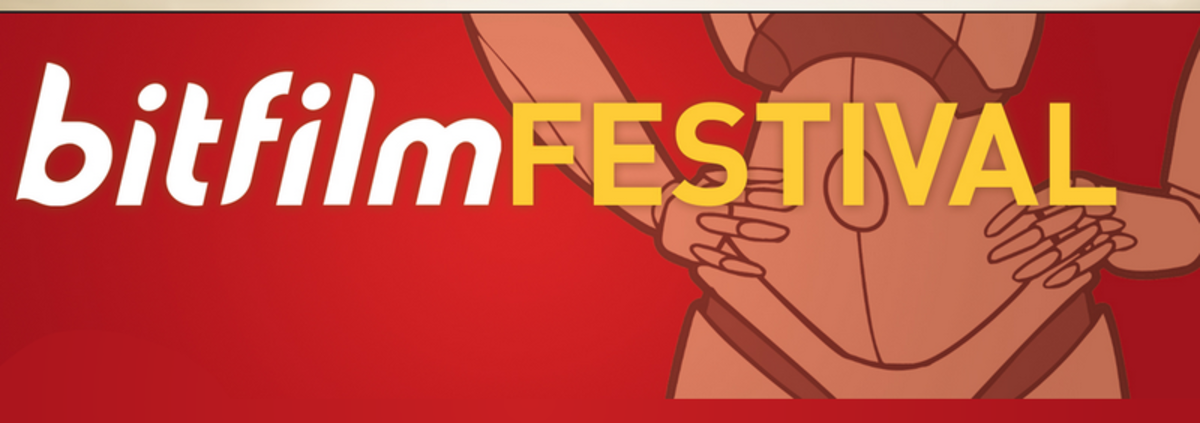
Aaron, your project, the BitFilm Festival, sounds really interesting. Can you tell me why you started this project?
The Bitfilm Festival started in 2000 as a festival about 3D animation and digital effects, then expanded to show films made for mobile screens, films made with computer games or real time demos. So the name “Bitfilm” is much older than “Bitcoin”, it just stands for digital film. We have been organizing the festival for thirteen years, on the Internet and in various cities such as Hamburg, Barcelona, Tel Aviv, New York and Tokyo, and we have always been looking for new stuff. In the last two editions we already experimented with Bitcoin by using it as prize money and as a voting tool.
We are absolutely fascinated by Bitcoin, so we re-invented the festival to become the world’s first film festival about Bitcoin – and we didn’t even have to change the name! Our goal is to reach “normal” people, who are interested in Bitcoin, but would not go to a conference or a meet-up, because they think it’s too geeky for them. Film is a great medium to explain Bitcoin in an easily understandable, entertaining way, and a festival that travels the world is the perfect platform to show them to a broad audience.
Which films will you show?
We will show all kinds of films, short and long ones, documentaries and animations, that explain Bitcoin or specific aspects of it.
Do you have an example you can provide?
Our headliner is the feature-length documentary “The Rise and Rise of Bitcoin” by Nicholas Mross, which will have its German premiere at our Berlin event. We will show a variety of animated shorts, both classics such as “What is Bitcoin?” from the “We Use Coins” team and the brand new “Bitcoin properly” by a team from the Netherlands, which focuses on other purposes of blockchain technology than money. In the Short Docs category we will show “Bitcoin in Uganda” by Bitcoinfilms.org, “Bitcoin: Buenos Aires” by Valerian Bennett and the “Declaration of Bitcoin’s Independence” by Julia Tourianski, to name a few.
What are the dates of your world tour and how did you pick the cities for it?
We will start in Berlin this Saturday, followed by Seoul on November 8th, Buenos Aires on November 29th, Amsterdam on December 3rd and Rio de Janeiro on December 6th. We are in talks with local organisers in Budapest, Toronto, New York, Cape Town and Sydney for more events; those dates will be disclosed soon. Everything has evolved organically: our venue in Berlin, the Platoon Kunsthalle, also exists in Seoul, Korea – so these two cities were a natural first choice. The Platoons are huge contemporary art spaces built of freight containers, really special places.
I will spend some time in South America in November and December, and I know the people who run the “Espacio Bitcoin” in Buenos Aires – a four story building full of Bitcoin start-ups – and who organise the Latin American Bitcoin Conference in Rio de Janeiro, so that’s how we picked those two cities. Then more and more people contacted us who are interested to organise an event in their town. We are very open to all kinds of cooperations – a goal that we have now is to be present on all continents. It looks as if we will be able to achieve that, if you don’t count in Antarctica.
Aaron, what does it take to become a local organizer for a Bitfilm event?
All you need is a good venue with a video projector and the means to reach the crowd to fill it. So if you organise Bitcoin meetups and have a well sorted mailing list, you are in a good position to do it. We will provide the films as digital files, digital templates of the ad materials that you can adjust to your needs, and do the global marketing. The local organisers will be the ones who sell the tickets, so they adjust the entrance fee to the local circumstances. In any case, the price should be lower if you pay in Bitcoin than if you pay in trash cash.
How did you choose MyPowers.com to list your coin?
We did the promotional video for MyPowers, which was a lot of fun, so it was just natural to go with them. If you buy a Bitfilm coin, which costs you 50 Millibitcoins, you will get a festival pass for a city of your choice, a t-shirt and triple voting rights. If you buy more coins you will get more stuff, like a pair of water-repellant geek jeans, or a dinner with the festival team and film directors, and your vote will have even more power. It is important to understand that the Bitfilm Coin is not another Altcoin, it is more like an idealistic share in the Bitfilm project.
Aaron, how did you originally get into Bitcoin in 2011?
I had been studying monetary systems and the Austrian school of economics for some years before that, so I was always looking for new developments in the financial world. First I was a bit skeptical about Bitcoin, because it is not backed by anything. It took me a while to understand that Bitcoin does not have to be backed, because it has the same qualities that made gold and silver the money of choice for more than 5,000 years. I started to blog about it in spring 2011 and in January 2013 I published a special issue about Bitcoin for a Libertarian magazine called BLINK, which does not exist anymore. But for me it was great to meet many important Bitcoiners, who I interviewed or who contributed articles, like Gavin Andresen, Mike Hearn, Erik Voorhees or Rick Falkvinge.
What do you think has been the most exciting development in the Bitcoin space in the past 6 months?
I am especially excited about the projects that take the principles of Bitcoin further and apply them to other aspects of human life – projects like Ethereum, Coloured Coins or BitNation. Abolishing the state monopoly on money and the banks’ privilege to create money out of thin air still remain by far the most important issues for me, as the crooked monetary system we have today is the reason why the distribution of wealth is so unfair.
But I also like the idea that you can now close any kind of contract on the Blockchain, without the need for a third party. I will definitely not marry in front of a representative of the government, because I do not want the government to tamper with my private life, but I love the idea of marrying on the Blockchain. That’s why Bitnation, who offer all kinds of services that have been provided by governments so far, but on a voluntary and decentralised basis, is currently one of my favourite projects in the Bitcoin space.
What else do you do beside the Bitfilm Festival?
My company, Bitfilm, produces commercial films for all kinds of clients, recently most of them Bitcoin start-ups. I am the writer and director; we work with many animators, designers, voice talents and musicians from all around the world. The festival is mainly a fun project, although we do showcase our own works, out of competition of course. I am also working on my own Bitcoin 2.0 start-up, but it’s too early to speak about that.










